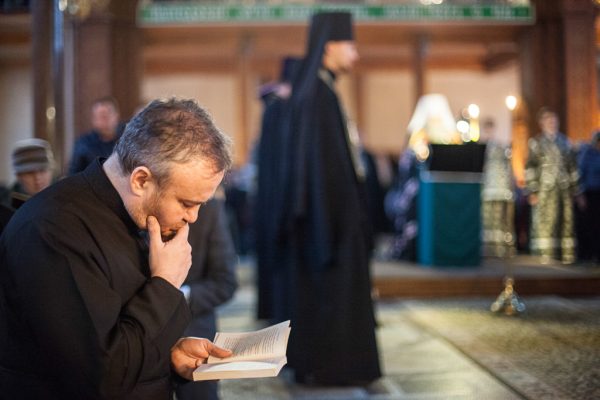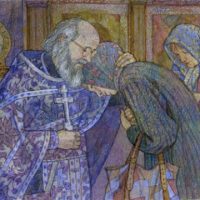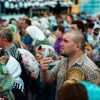We hear in the Matins of Cheesefare Monday the following words:
The door of divine repentance has been opened.
Let us enter with fervor, having cleansed our bodies,
Observing abstinence from foods and passions in obedience to Christ
Who has called the whole world to His heavenly Kingdom,
Offering to the Master of all this tithe of the year,
That we may look with love upon His Holy Resurrection (Matins of Cheesefare Monday)
Having arrived at this ‘door’ of repentance, Christ invites, beseeches us, to enter for our soul’s sake so we may make a new beginning, one marked by a renewed, great effort to focus more on Christ, unencumbered by the constant giving in to the passions. Through our worship, our prayer, our fasting and alms, we learn to struggle and engage a spiritual battle to orientate ourselves more to Christ and His Kingdom more than ever before, building up for ourselves treasure in heaven. We do this knowing that salvation is at hand, that this “tithe of the year” is meant for our advancement in the Kingdom of God, as we hear today: “Our salvation is nearer at hand than when we first believed” (Rom.13:11).
We neglect such an opportunity at our own peril. Complacency, being satisfied with our current spiritual state is a great enemy to our healing and salvation. In order to do battle and advance, we throw off all those worldly distractions, entertainment, feasting, and instead, strive to fill our time, our thoughts and hearts with Christ, we learn to be sated by Christ. We make use of the divine services which He gives us through His Church so we can allow the truth that Christ is to ‘wash’ over us again and again, till it has, by God’s grace begun a change in us.
Christ teaches us this day that all our ‘actions’: fasting, abstinence, worship, prayer, increased offerings, alms giving, are meaningless if not also accompanied with a sincere desire for an interior change: to learn to love more as He loves us, to forgive as He has first forgiven us. And so, we discover this truth: the fasting, praying, worshiping, and alms-giving are internalized if they’re to have their full and deifying effect, furthering us in our growth and healing in Christ.
This is the purpose of this great ‘spiritual hospital’ we call Lent: We cross the doorstep into Lent with a desire for healing, to seek freedom from bitterness, envy, anger, pride, lust—all the sins and passions that cause us spiritual sickness, and death—death because they separate us from our life-source, Jesus Christ, death because we cannot hold onto them and come into Christ’s near presence and communion (koinonia). Into our brokenness—the brokenness of ourselves and our relationships, Christ calls on us to interject this act of grace: loving, forgiving one another. But how? It’s so difficult, it’s beyond us! Yes! So, we learn to trust God for the faith to believe a new way is not only possible but inevitable as we cooperate with the Holy Spirit this Lent.
Now there’s no getting around it: if taken seriously, Lent is hard work, a great struggle, and it can be daunting. But that’s just it: There’s no ‘comfortable’ or ‘armchair’ road that leads us into the Kingdom of Heaven. So, Lent, being a spiritual hospital, cannot be ‘comfortable.’ ‘No pain, no gain’ could also perhaps be an apt slogan for our Lenten struggles too. Anyone who’s been to a physical therapist knows that without some pain, stretching muscles and joints, there’s no chance for healing. So it is also for our souls: We are spiritually and physically stretched (God created us with both physical and spiritual attributes) in order to make progress in His divine life.
Being open to Christ’s healing means we follow the prescription He gives us through His Church as close as we can. We don’t go to a doctor, receive the diagnosis and prescription, but then say, “Oh, I’ll just take half of the prescription, thank you!” Or, “I know this has been proven effective, but I’ll just make up my own.” We fast, as close to the ‘prescription’ of the Church as possible, always with a blessing, because accountability is also part of the healing from our pride and disobedience. We pray the Prayer of St. Ephraim with prostrations and metanias twice a day, as able. We carve out time from our work and family life to attend the Wednesday Presanctified Liturgies and the services of Holy Week, we make full use of sacramental Confession, so that we can hunger and thirst more after Christ and His Kingdom.
In order for this return, this victory to happen, in order for us to be able to participate more fully and faithfully in Great Lent, we begin Lent with an interior cleansing of the soul, forgiving one another and asking forgiveness from one another for all the ways that you and I, through our sinfulness, ‘pollute’ the world and our relationships which God has made good.
Those of us who’ve grown up in a culture with Christian roots often take forgiveness for granted. But being forgiven, asking forgiveness, is certainly not universally known in the world or in other religions, certainly not in Islam or even in our own culture today. In Judaism, the practice was, “an eye for an eye, a tooth for a tooth.” Asking forgiveness and forgiving is truly of the Kingdom of God, the fullness of the life in Christ.
For this reason, forgiveness is often a struggle; it is, in its sincerity, reflective of that return to Paradise from which our sins have exiled us, and which is the ultimate purpose of our Lenten journey–to return. To forgive involves both love and humility; where pride reigns, forgiveness and love cannot take root. This is a hard but necessary truth for us to hear.
Against the background of this teaching, Jesus speaks to us in today’s Gospel, reminding us: “If you forgive men their trespasses, your heavenly Father will also forgive you. But if you do not forgive men their trespasses, neither will your Father forgive your trespasses.”
As with everything Christ teaches us, there’s nothing arbitrary here. When we ask forgiveness, we’re recognizing that we’re sinners too, that my sins, my fallenness, affects others; our sins dim the light of Christ in us meant to illumine the world around us; our sins mar the beauty and goodness of creation and darken the image of God and His likeness in us. For this reason, this day, we’ll ask each other’s forgiveness, whether or not we have any ‘personal’ sins to forgive.
Sometimes this journey to healing and growth is painful; it certainly always involves struggle because the coping patterns and habitual sins we’ve become accustomed can be so ingrained in us, being part of the fallenness around us and inside us. Forgiveness is a big part of this healing, which is why it’s not an ‘optional’ part of our life in Christ.
While forgiveness isn’t always easy, it’s also not always instantaneous. Forgiveness can sometimes necessitate an active and ongoing decision and attitude, e.g., “I want to want to forgive. Help me, Lord!” We may need to pray for that ability to forgive daily. This can also be part of the healing and growth in humility that enables us to receive Christ’s healing. When we actively forgive, we become more like God Himself, who forgives us willingly; we become more fit to be in communion—in the near presence—with holy God.
With this objective in mind—with Christ before us—I encourage you, to beseech the Holy Spirit to open your heart to this work of healing in your soul as we participate in the Rite of Forgiveness this day and throughout our Lenten journey. May this season be the beginning of a deeper, abiding love for Christ, a desire to bring His Kingdom to bear on our daily lives, to more fully follow the only way that leads to life—the life that Christ God alone is.
In this renewed spirit of mutual love and forgiveness, we journey with Christ through the desert of the next 40 days and on to the cross and resurrection on the third day. May our treasure truly be found in heaven as we prioritize the life in Christ above all else, so that we truly meet Christ and through Him find increased freedom from the passions and growth in His divine grace. Then and only then, His victory over sin and death will become ours as well.




















